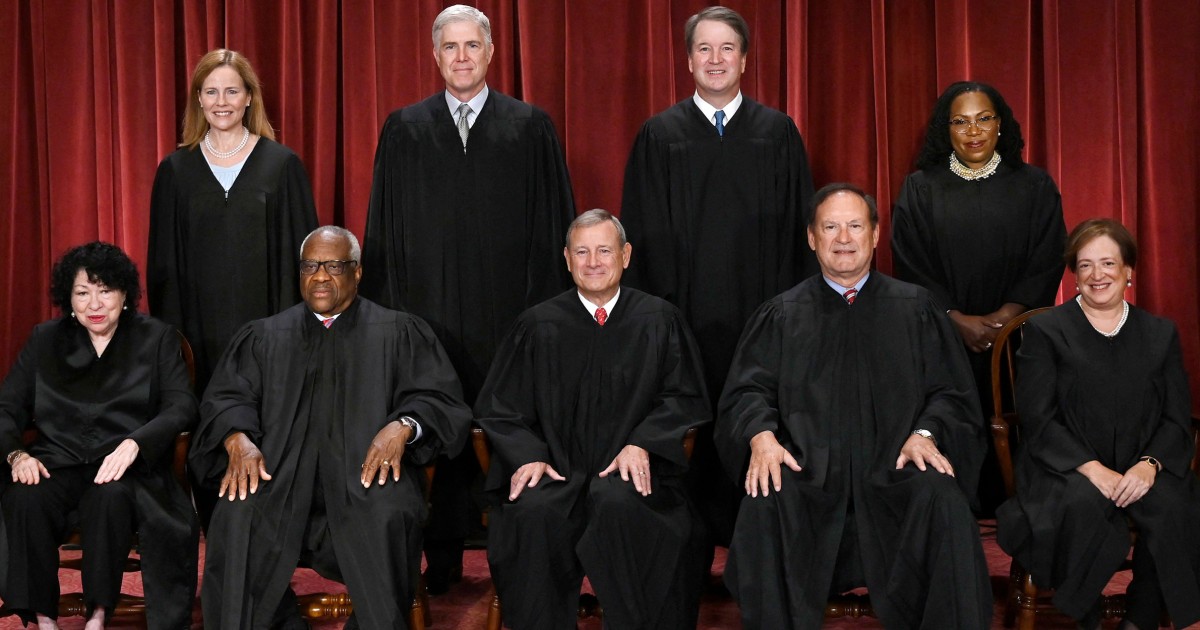By Lawrence Hurley - NBC News
The Supreme Court was always likely to play a decisive role in deciding the many legal issues arising from the cases facing former President Donald Trump.
However, the day may have come sooner than expected.
The court, with a 6-3 conservative majority that includes three Trump-appointed justices, now has two novel and weighty legal issues to weigh before the 2024 election year even begins.
They are: whether the former president has presidential immunity for alleged criminal acts he committed while in office, and whether he is even eligible to run for office again.
Former President Donald Trump during his civil trial in New York, Nov. 6, 2023.Associated Press
"This is a once-in-a-generation, perhaps once-in-a-lifetime confluence of events in which the court is faced with a very basic and very important issue relevant to self-government — the biggest since Watergate," said John Elwood, a Washington lawyer who argues cases in court.
Last week, special counsel Jack Smith asked the justices to immediately intervene on the question of whether Trump has immunity in the federal election interference case. If the Supreme Court agrees with Trump, this may lead to the charges in this case being dismissed.
Now, following the Colorado Supreme Court's ruling issued Tuesday, Trump's legal team has already made clear that it will immediately ask the justices to overturn the decision stipulating that the former president cannot appear on the Republican primary ballot in the state, due to his role in the events leading up to the Jan. 6, 2021, attack on the U.S. Capitol.
The case revolves around the 14th Amendment to the Constitution, which prohibits those who "participate in insurrections" from holding public office. It raises many novel legal questions, including whether it applies to someone running for president.
Also looming is a case the court agreed to hear last week about a man indicted for his actions on Jan. 6 that could affect Trump's indictment in Washington, given that the former president faces charges under the same federal law in question. That case is one of four criminal prosecutions Trump is facing.
The politically divisive nature of the cases is a particular challenge for the court, which saw its favorability rating in the polls fall following its decision last year to overturn the landmark Roe v. Wade ruling. Wade decision on federal abortion rights.
That ruling sparked a debate over whether the court's legitimacy was threatened by the risk of losing the public's trust. More recently, it has been rocked by allegations that some justices, notably conservative Clarence Thomas, have failed to meet ethical standards.
Echoes of the 2000 elections
The Supreme Court's central role in Trump's legal battles is already drawing comparisons to the 2000 election, when the justices eventually issued a crucial 5-4 ruling that ended Florida's recount, allowing Republican nominee George W. Bush to prevail over Democratic opponent Al Gore.
"Once again, the Supreme Court is thrust into the center of a U.S. presidential election. But unlike in 2000, the general political instability in the country makes the situation much more precarious now," wrote Rick Hasen, an election law expert at the UCLA School of Law, immediately after the Colorado ruling.
In a follow-up email, Hasen added that such a ruling, unlike the immunity issue, goes to the heart of the election itself.
Rick Pildes, a professor at New York University School of Law, expressed himself in similar terms, agreeing with Hasen that the Colorado case, in particular, poses great risks to the court.
"Unless he reaches a near-unanimous decision or decides the case in a way that dispels the perceived ideological divisions in the court, half the country is going to believe he acted in a partisan manner," he explained.
In all of the election-related cases now before the court, timing is key, as Trump is the front-runner for the Republican nomination and the primaries are fast approaching.
The Colorado Supreme Court turned the heat down on its own ruling by making clear that the decision will be put on hold indefinitely once Trump asks the U.S. Supreme Court to intervene.
The state court said that in the meantime, Colorado authorities "will continue to be required to put President Trump's name on the ballot in the 2024 presidential primary" until the Supreme Court acts.
A Few Months Before Colorado's Primary
With the Colorado primary voting deadline in early January, there is little time for the Supreme Court to do anything substantive before that, meaning it remains reasonably likely that Trump will be on the March 5 primary ballot as litigation continues.
The Supreme Court could, if it wishes, take the case and issue a ruling, although unless it acts with unusual speed, its ruling could end up being applicable only in the general election. Any decision would affect similar cases in other states.
Justices also have the option to go slow on the immunity issue despite Smith's request, which seeks to circumvent the normal appeals process. The case continues in the U.S. Court of Appeals for the District of Columbia Circuit, which has yet to rule. He is scheduled to hear oral arguments on Jan. 9.
The Supreme Court could simply wait for the appeals court to act before deciding whether to intervene. Trump's response to Smith's request is due Wednesday.
In the separate case of Jan. 6 defendant Joseph Fischer, the court will decide in the coming months whether to dismiss a charge accusing him of obstructing an official proceeding, namely congressional certification of President Joe Biden's election victory. It's one of the charges Trump faces in the election interference case in Washington, which is set to go on trial in March.
Trump could use the impending sentencing in Fischer's case to try to delay the start of the trial and, if the man wins, could try to dismiss the indictment.

